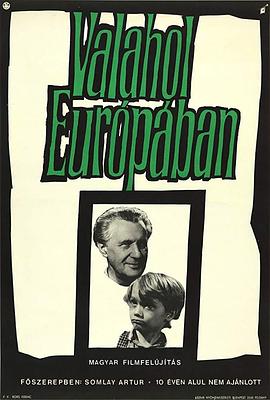简介
Somewhere in the remote region, the war ends. In the midst of ruined cities and houses in the streets, in rural hamlets, everywhere where people still live, are children who have lost their homes and parents. Abandoned, hungry, and in rags, defenseless and humiliated, they wander through the world. Hunger drives them. Little streams of orphans merge into a river which rushes forward and submerges everything in its path. The children do not know any feeling; they know only the world of their enemies. They fight, steal, struggle for a mouthful of food, and violence is merely a means to get it. A gang led by Cahoun finds a refuge in an abandoned castle and encounters an old composer who has voluntarily retired into solitude from a world of hatred, treason, and crime. How can they find a common ground, how can they become mutual friends The castle becomes their hiding place but possibly it will also be their first home which they may organize and must defend. But even for this, the price will be very high. To this simple story, the journalist, writer, poet, scriptwriter, movie director, and film theoretician Béla Balázs applied many years of experience. He and the director Géza Radványi created a work which opened a new postwar chapter in Hungarian film. Surprisingly, this film has not lost any of its impact over the years, especially on a profound philosophical level. That is to say, it is not merely a movie about war; it is not important in what location and in what period of time it takes place. It is a story outside of time about the joyless fate of children who pay dearly for the cruel war games of adults. At the time it was premiered, the movie was enthusiastically received by the critics. The main roles were taken by streetwise boys of a children's group who created their roles improvisationally in close contact with a few professional actors, and in the children's acting their own fresh experience of war's turmoil appears to be reflected. At the same time, their performance fits admirably into the mosaic of a very complex movie language. Balázs's influence revealed itself, above all, in the introductory sequences an air raid on an amusement park, seen in a montage of dramatic situations evoking the last spasms of war, where, undoubtedly, we discern the influence of classical Soviet cinematography. Shooting, the boy's escape, the locomotive's wheels, the shadows of soldiers with submachine guns, the sound of a whistle—the images are linked together in abrupt sequences in which varying shots and expressive sharp sounds are emphasized. A perfectly planned screenplay avoided all elements of sentimentality, time-worn stereotypes of wronged children, romanticism and cheap simplification. The authors succeeded in bridging the perilous dramatic abyss of the metamorphosis of a children's community. Their telling of the story (the scene of pillaging, the assault on the castle, etc) independently introduced some neorealist elements which, at that time, were being propagated in Italy by De Sica, Rossellini, and other film artists. The rebukes of contemporary critics, who called attention to formalism for its own sake have been forgotten. The masterly art of cameraman Barnabás Hegyi gives vitality to the poetic images. His angle shots of the children, his composition of scenes in the castle interior, are a living document of the times, and underline the atmosphere and the characters of the protagonists. The success of the picture was also enhanced by the musical art of composer Dénes Buday who, in tense situations, inserted the theme of the Marseilaise into the movie's structure, as a motive of community unification, as an expression of friendship and the possibility of understanding. Valahol Europaban is the first significant postwar Hungarian film. It originated in a relaxed atmosphere, replete with joy and euphoria, and it includes these elements in order to demonstrate the strength of humanism, tolerance, and friendship. It represents a general condemnation of war anywhere in the world, in any form.
猜你喜欢
-
正片
蚀 커터
主演:崔泰俊,金时厚,文佳煐 -
正片
流播
主演:姜河那,李都恩 -
正片
滕达伯里
主演:Kota,Johan,Yuri,Pleskun -
正片
Veera Dheera Sooran: Part 2
主演: -
正片
守望相助
主演:杰克·奎德,杰弗里·迪恩·摩根,玛琳·阿克曼,Cecile,Cubiló,Nicole,Cyrille,吉姆·克洛克,哈里森·斯通,Tim,Casper,Derrick,Goodman,Jr.,Krishna,Sistla,Ward,克里克·威尔逊,Charles,Arthur,Berg,乔纳森·福勒,柯蒂斯·莱昂斯,莱斯利·赛德斯,Visionz2turnt,Meg,Biddle,Smith,Rhianna,Richey,Melanie,Jeffcoat,Kendall,Wakefield -
正片
Warlord
主演:斯图尔特·布伦南,Jennifer,English,瑞安·盖奇,比利·博伊德 -
HD
命中罪爱
主演:张静初,芦芳生,余皑磊,高冬平,董畅,张宁浩,李晓川,富冠铭 -
HD
博莱罗
主演:拉斐尔·佩尔索纳,多莉亚·蒂利耶,让娜·巴利巴尔,艾曼纽·德芙,文森特·佩雷斯,安娜·阿尔瓦罗,索菲·吉耶曼,亚历山大·萨洛,玛丽·德纳尔诺,Mélodie,Adda,Florence,Ben,Sadoun,塞尔日·里亚布金,Joniece,Jamison,Jelle,De,Beule,卡琪娅·申库,Elisa,Doughty -
正片
爱丽丝梦游仙境2:镜中奇遇记
主演:约翰尼·德普,米娅·华希科沃斯卡,海伦娜·伯翰·卡特,安妮·海瑟薇,萨莎·拜伦·科恩,瑞斯·伊凡斯 -
正片
黑道警察
主演:大卫·阿奎特,凯文·康诺利,Leila,Ben,Khalifa,杰里米·卢克 -
HD
甜心女孩
主演:杰森·莫玛,伊莎贝拉·莫奈,阿德里娅·阿霍纳,艾米·布伦尼曼,迈克尔·雷蒙德-詹姆斯,凯蒂·M·奥布莱恩,贾斯汀·巴萨,曼努埃尔·加西亚-鲁尔福,布莱恩·豪威,内尔森·富兰克林,雷吉·李,莱克斯·斯科特·戴维斯,拉扎·杰夫里,多米尼克·福穆萨,戴尔·帕文斯基,米丽娜·里韦罗,威尔·布拉格罗夫,詹妮弗·克里斯塔·帕尔默,威廉·卡尼亚,瑞奇·麦克道尔,Devin,Reeve,Josephine,Zoumanigui -
正片
给咖啡加点糖
主演:陈锐,李凤绪,杜荣,彭立志,吴剑华,张宇翔,胡志强,董艳博

